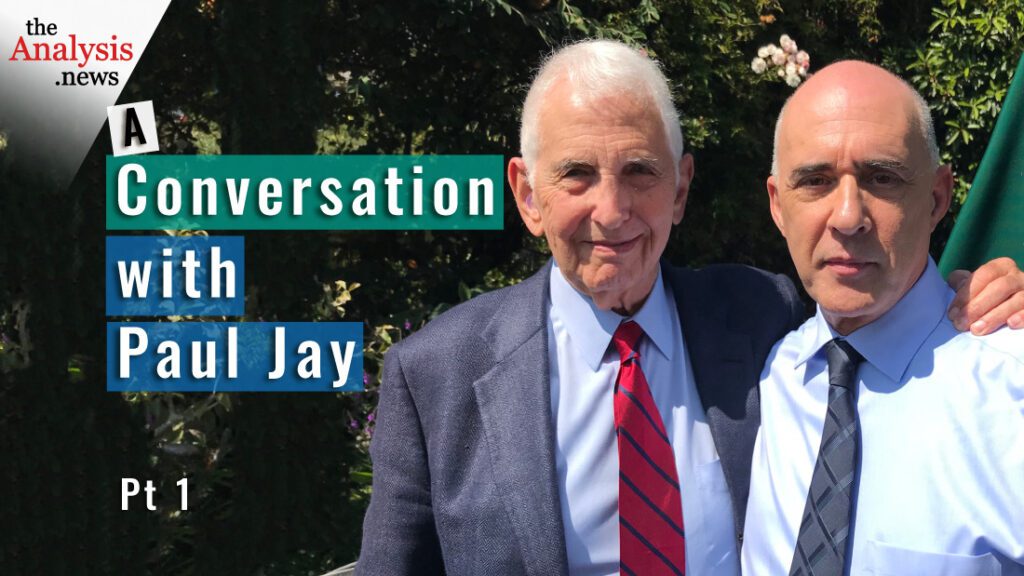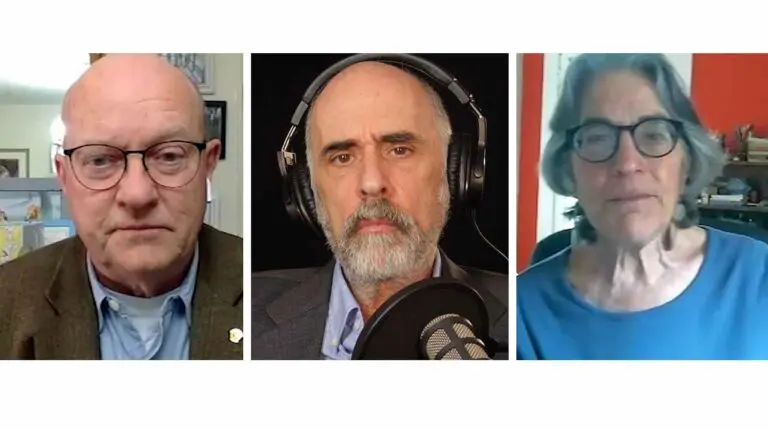Paul is interviewed by Andrew Van Wagner where they continue their discussion about nuclear weapons, the media, and climate crisis.
TRANSCRIPT
Andrew Van Wagner
Apparently, these nuclear planners, there’s a profound amount of groupthink among them. They’re very bubbled off, very isolated, and that may yield some of the irrationality behind nuclear planning as well.
Paul Jay
I think it’s also— I interviewed a guy, and this is a story I don’t think anybody knows about but me. I mean, I published the interview, but mainstream media doesn’t pick up on it. I interviewed a guy, Lester Earnest came out of the military and was one of the first computer receptions of the armed forces in late 1950. Get’s hired by MIT. They’re developing a defense system against Soviet nuclear bombers. When you see the big board in Doctor Strangelove the movie and see where they can track with lights, everything coming in, they had this brilliant radar system. He gets hired to do command and control for the system at MIT, and over 25 years, a trillion dollars.
Anyway, he’s been there for about a week. And he asks one of his colleagues there, he says, how did you guys solve the radar jamming problem? And there’s this long silence. He says, the guy says, well, we don’t talk about that. Lester says, well, if you didn’t solve the problem of radar jamming, then what’s the point of all this? The answer was, well, we don’t talk about that. The whole thing was bullshit.
The greatest creation of harnessing of computer power in history. Warehouses and warehouses of computers to control these radar systems. A part of the system was Bomarc missiles; that they would then shoot down the Soviet aircraft guided by this massive computer system. It never worked because of radar jamming. They wouldn’t discuss it because there was so much money to be made. And then Lester, after about a year, a year and a half there, he’s asked to go to the Pentagon and Congress and persuade them that Bomarc missiles should have nuclear weapons on their tips.
I said, hold on. You’re going to have a Soviet nuclear bomber flying over Canada and the United States, and you’re going to shoot it down with a nuclear weapon. So you’re going to have a nuclear weapon blowing up nuclear weapons over North America, and that’s your defense strategy. I said that’s insane. He said, of course, it’s insane. I said, did you go to the Pentagon and Congress? He said I did. And did they agree? They did. And they did arm Bomarc missiles. I said, Why did you do it? He said we’re all making so much money. We were so cynical. And if we didn’t do it, somebody else would.
It was just a classic scenario, that line. If I don’t do it, somebody else will do it. I might as well make some money. He and his colleagues figured, you know the world’s going to be blowing up sooner than later anyway, so what the hell?
Profound nihilism, cynism, a bubble of denial fueled by how much money you make. And it’s easy to rationalize all the other sides doing it, too. But that whole system— in fact, there’s a study that came out of the ’60s [Robert] McNamara in the mid-60s got a study made of this. It’s called the Sage Radar System. S-A-G-E. The study concluded it was nonsense. It would never have worked. A trillion dollars. That’s what I mean. The system itself is fundamentally irrational and nothing more than its military thinking and strategy.
Andrew Van Wagner
There’s a quote; I think it’s in Ellsberg’s book from a guy named General Power, which is just a hilarious name. Do you know the quote that I’m referring to? Where he said, that would really screw up the plan.
Paul Jay
The quote from him is, how do you define victory at the end of a nuclear war? If there’s two Americans and one Russian, it means we’ve won.
Andrew Van Wagner
That was incredibly disturbing stuff to read. Yeah, fantastic, so that sounds like it’s going to be an absolutely fantastic project. I’m very excited. I think if you look at public opinion, you can ask the two existential threats to the species / to organized civilization are climate and nuclear. You can ask how many people in the public put these issues at the top of the list? For those two. So for climate, I don’t know if events of the last year have moved the needle on that. But on nuclear, I’d imagine almost nobody thinks that that’s a major issue. It doesn’t come up in the presidential debates, right? They never ask them about nuclear, practically, right? In the United States, it’s not really on the radar, right?
Paul Jay
To some extent, people in the climate movement and others, they think it’s already so doomsday-ish with climate. How do you add nuclear? How do you bring up that topic in the context when there’s already a pandemic? But it’s precisely that, like, are you going to trust people that couldn’t deal with a pandemic that they’ve been warned about for decades? Trust these people with nuclear weapons? Do you think we’re safe now? And these are the people that couldn’t figure out to have masks and oxygen when they were told.
There is this movie called Contagion; I think it was made in 1991 or something. It exactly says what happened. I mean, there’s been warning after warning, and they wouldn’t heed, and we’re supposed to trust them with nuclear weapons? And of course, now we’re supposed to trust them on the climate side. Half the United States, or what is it 40%, don’t believe in vaccinations or masks. The same people more or less don’t believe in climate science. Why? Well, they want to talk about FOX and [Donald] Trump and blah, blah, blah. But it’s a complete evisceration of the public education system in rural America.
Why do people believe QAnon? Because they know nothing about history. I can’t say Canada is that much better. I knew a young woman who was going to high school. This is 25 years ago in Ontario who had an essay. She had written an essay about the Nazi S.S. [Schutzstaffel] and World War II, and she equated the Soviet Union with the Nazi S.S. She had them as the same thing. And she got an A-plus on the essay because I don’t think the teacher knew the difference.
At least in urban— most, I think that’s an incredible example. But in most of the big cities, the public education system is not that bad. But go to rural America, they’re trying to— if they had their way, they would have creationism as a topic of science, the backwardness. You have to blame corporate Democrats for this because when the Democrats are in power, especially federally and at the national level. But even when they were in power in these States that have now become Republican, but many of them used to be Democrats, they didn’t invest in a public education system that really educated people. It’s not the only reason. But one of the reasons for the demise is where do most of the soldiers come from? Most of the American soldiers come from these rural States with education systems where people learn nothing about anything real about history or science. These kids go off to war thinking they’re fighting. Save America from something.
So if you did a poll, certainly in the urban centers, you would find people with no climate. Now, I think it’s much more significant. Now when I say rural America, certainly 20-30, even 40% of rural America, is probably not so badly educated many know about climate. In agriculture, they’re seeing forest fires and seeing droughts. Climate is increasingly on the radar. But nuclear, not even in the cities, not even in the left, not even the most educated sectors of the population. The tiny, infinitesimal fraction of people are focused on it, and some basic steps could be taken. Certainly, Canada could refuse to have anything to do with nuclear weapons. They don’t take that stand. In the U.S., there could be at the very least get rid of the hair-trigger mechanism; that gives very, very little time to make a decision whether something on the radar is real or not. There could be a massive reduction in weapons.
There is a whole list of things Ellsberg has proposed that could be done. In some ways, it’s easier than could be dealt with climate. But the consciousness isn’t there.
Andrew Van Wagner
Yeah, it’s interesting because it’s not that presidential debates are the end-all and be-all. But they are kind of like a litmus test of what’s on the radar. And you see, there wasn’t a climate debate. There was going to be. And then it got cancelled, right, in the Democratic primary. But you can’t even imagine a nuclear-themed presidential debate. It’s hard to even imagine that, right?
Paul Jay
Yeah, there was one piece of legislation that was introduced by [inaudible 00:11:25], and I can’t remember the other representative calling to stop this new investment in ICBMs [Intercontinential Ballistic Missiles], the modernization. It got almost no play in the press. It doesn’t— suddenly going anywhere in Congress. It’s something they even introduced in, but it’s got no legs.
Andrew Van Wagner
What are the most exciting projects that you know of that others are working on?
Paul Jay
Well, I’m interviewing a woman named Jane McAlevey. She’s been a Union organizer for a long time. She’s very successful. She’s now training literally thousands of organizers. I’m doing a Reality Assert’s Itself with her, which is biographical but also gets into what she’s learned about organizing in the working-class, in Unions, but also electorally. It’s to do with real organizing. Where you actually get workers to join, either join a Union or join an organization.
She makes a very interesting differentiation between advocacy and organizing and that much of the Left is involved in advocacy. You have an issue. You make a lot of noise about it. You get people to sign up for it. You get people to vote in an election, but it actually doesn’t organize people into an organization that then has some force. She’s been mostly focused on Unions and very focused on winning, getting workers prepared to win strikes, or increasingly getting involved in elections. She calls it a whole worker organizing strategy. So, if you’re organizing in a factory, you’re not just trying to find the influencers amongst the working force to become the leaders. You’re where those workers go to Church. Where are the organizations? Are they in the community? Where do they play sports? You organize everywhere. It’s called a whole worker organizing. To me, it’s an exciting project because she’s organizing and training so many organizers. I think in a broader way, that’s what the Left needs to focus on, and I include myself in this.
What we can do in the media is so limited. It’s, first of all, so easy to marginalize progressive media. It’s so easy to marginalize progressive organizations that rely on advocacy as opposed to organizing. The only way out of all of this mess is a massive amount of organizing. In some ways, especially areas of the working-class that have been really influenced by Trumpest kind of politics. I’m talking in the U.S. now.
There’s similar stuff happening in Canada and the fact that Ontario— Doug Ford is this right-winger Premier of Ontario. You’ve got lots of it. It goes back and forth. The necessity to not rely on this supposed fight for public opinion when the elites control all the means of mass communication and mass creation of public opinion. What they can’t control is on the ground organizing, and that’s where, in the U.S., you’ve seen some breakthroughs like the Progressives that have gotten elected by AOC [Alexandria Ocasio-Cortez] in Queens and the Bronx. A lot of Progressives have got elected into the New York State Assembly and other parts of the country. It’s not always successful, and it hasn’t been going on that long.
The Bernie Sanders campaign showed some of it, but it was real on-the-ground organizing in communities. That direct contact bypasses the elite’s control of mass media and, so, if you’re asking me about one project I’m aware of— there are some others too, where there’s that kind of organizing going on in the U.S. I’m actually not aware of that much going on in Canada. Actually, maybe it is, and I’m not aware of them. In some ways, I think, there’s more on-the-ground organizing going on in the U.S. The problem there is it’s so silent. You’ve got this group’s doing that. That group’s doing this, and there’s a lot of sectarian fighting going on. The amount of trashing that goes on by the Left of the Left. The serious organizers aren’t doing that. A lot of it goes on, on the Internet.
Anyway, any of these groups that are doing that kind of real organizing, I think, is not just exciting, especially when it’s in the working class and especially when it’s directed towards Unions and organizing and organized workers. There are only two hopes we have: one is that kind of organizing, and then two, because of the time frame of climate there’s no alternative to what I’m about to say; some sections of the elites have got to wake up.
There are sections of the elites and the billionaire class that just— and there are some already, and even they’re marginal, without some section of the elites, that get the real existential threat of climate and don’t just see it as a money-making opportunity; which is where most of the rhetoric really comes down, and it gets serious about the science. Because the Biden plan, while it’s something compared to denial, such a reliance on carbon capture which is still, at least at any scale that’s meaningful, quite unproven. The time frame for the Biden plan, the time frame for the Trudeau plan, and the time frame for virtually all the advanced capitalist countries is completely out of whack with what the scientists say is necessary.
So— and we’re going to talk more about Clinton, and I’d like to, but if you’re asking me, the projects that excite me are not media projects. They are on-the-ground organizing.
Andrew Van Wagner
You talk a lot about BlackRock, and it’s interesting because, you know, Larry Fink, he had this letter where he talked about climate ESG [Environment, Social, and Governance]. That’s the corporate trend, right, and it is interesting to see, kind of, moves in the corporate sector towards support for decarbonization. What do you make of that? Including Larry Fink. He’s probably one of the mascots of the whole ESG corporate movement. What do you make of all that?
Paul Jay
Well, they’re caught between BlackRock and a hard place. They get it. They see the science, but they can’t, on their own, disrupt the laws of capitalism. So, I’ll give you an example with BlackRock. BlackRock said that they’re— two things. They were going to reduce their investment in coal, and they said because they are an index fund, which means they invest in every single thing in an index. So, they ask for S&P 500, and then they buy the whole S&P 500, which is why they own significant voting shares of everything, but that includes companies that do coal.
So, Fink was interviewed by this guy [Donat] Sorokin, and Sorokin asked him, well, you’ve got this enormous power— you and the other asset management companies. Why don’t you lean on the S&P 500 to throw coal out of the index and tell them you’ll stop investing in the index if they don’t get rid of coal? Well, of course, Fink had no answer for that because one, they make a lot of money out of all that and two, they just won’t take it that seriously but then Fink announces they also make discretionary investments where they pick and choose stocks. They have the funds. Now, BlackRock has all kinds of funds, so one of them is discretionary, and so he says, we won’t invest in any company that makes more than 25% of its revenue from mining coal. So, it sounds great, all the big coal mining companies that BlackRock’s going to pull out of, disinvest in. The problem is that one of the largest coal mining companies in the United States, I think Continental, but I could well be very wrong with the name. I’ll look at my article. At any rate, I think, it’s the second-largest coal mining company in the U.S. Well, they’re the second-largest coal miner but coals less than 25% of their revenue, so BlackRock doesn’t have to disinvest. It’s a shame, I mean, it sounds great, but it’s meaningless. Let’s say BlackRock even does start to disinvest from coal; one of the other funds is simply going to buy the shares. They’re just going to pick it up because unless there’s government intervention, unless the state steps in and says that everyone’s disinvesting from coal by law, then there’ll always be a company that says, well, nice for you, BlackRock. Maybe you can afford to get out of coal, but we need the money, so we’re going to get more into coal. So, it turns out to be just smoke and mirrors. Larry Fink knows that. This is what I mean to be caught between a rock and a hard place because they know only government intervention, only serious regulation, only laws, not tax maneuvers, not market mechanisms— although I’m not against them as a secondary tactic, the primary tactic is real laws that phase out fossil fuel. If you give the state, the government, that much power, then the next thing is going to be; maybe there should be serious regulation of the financial center, which of course there should be because they almost destroyed the global economy.
The whole finance sector is B.S. because without public money coming in and bailing them out of their speculative manias, they would have all crashed and burned in ’07, ’08, and since. I mean, even the stock market now is only soring like a rocket ship because the Fed is making sure it can’t collapse during the pandemic. So, the state is an appendage of the financial sector. So, the hard rock at the hard place is that they know with climate it takes that kind of action, but if you take that kind of action, you have to change the nature, certainly of American capitalism if not global capitalism. You have to greatly increase the interventionist and the planning.
I mean, how do you have a transition without a planned economy? How do you transition from fossil fuel? Even the mechanisms that they’re talking about, the market mechanism, they’re kind of planned economies— trying to push the economy from fossil fuel to sustainable. It has to be done for real. How can BlackRock to the financial sector except that, because now you’re handing over to something the public might have some control of. It’s a real conundrum. So, there are a few individuals in the elites and the billionaire class that get it, I think. They don’t have that kind of serious power.
[Daniel] Ellsberg has a great line on the nuclear stuff. He says, You’ve got to act as if we’re on the Titanic, but they’re still time to turn the ship away from the iceberg. You’ve got to hope that the captain will tell them— this is what I like about his metaphor. He says you’ve got to hope the captain will pick up the phone and tell the owners of the Titanic to go fuck themselves. We’re not going to be in a race. We’re going to slow down. At night we’re gonna stop, and we’re gonna make a safe crossing. It was the owners that wanted to show they were the fastest boat and that it could do this and do that. Of course, the captain never made that call. So, you can’t put a rosy picture on our situation. We’re at a very existential moment for the human species. The elites right now, between the withdrawal of Afghanistan, the rivalry with China, and all the geopolitical shenanigans, the system is fundamentally irrational. At least there’s a conversation about climate now.
I interviewed that guy, the climate scientist who was the co-lead author of Chapter 11 of the new IPCC [Intergovernmental Panel on Climate Change] report. It’s on my site. Well, his co-author, a woman, I think she’s Swiss maybe I’m wrong, but she’s European. She was quoted when they released the IPCC report saying she didn’t think she would ever work on another IPCC report. She said, what’s the point? It just gets ignored. She says it’s not a good use of scientists’ time, and you, it’s— I don’t know, I’m not sure how we break through the cultural bubble that exists.
The problem, kind of, goes this way. One is, probably the majority of North American’s economically are doing okay and even well. A slim majority, but a majority. The other section of people who are desperate economically, how do they think about anything but how to survive the month? Then the Left is very sectary. There’s a lot of fight that goes on. There’s no great national organizing women. That’s where we are. The hope is that— you ask me for another project that I find exciting. I do find exciting in the U.S., less so in Canada, the Progressive types that are getting elected at different levels and those campaigns where they knock door-to-door. As far as I understand it the Internet organizing plays a secondary role. The Sanders campaign, the Internet played a very big role, but in these individual races, it’s real, local organizing. These election campaigns are also becoming organizing campaigns. There’s some hope there, but you never know histories, you know, weird. Sometimes there’s galvanizing events, and all of a sudden, people break out of their inertia and their habits—the lead-up to the Iraq war. Millions of people around the world demonstrated against the war. It wasn’t successful, but it was a moment that was really something. All of a sudden, the most interesting thing about those protests was the number of people that had never been in a protest before in their lives and all of a sudden, something just broke through.
I’ve talked about this before with Katrina and 9/11, to some extent. Every so often, the fabric of American mythology— and it’s true for Canada, too, it gets shredded by an objective event. All of a sudden, people start to see the real world. With Katrina, when the hurricane hit New Orleans— such a disaster. All of a sudden, the media actually discovered such a thing as race and class in America. They even talked about it for about three weeks. So, there might be another galvanizing moment. I just hope that when the moment comes, Progressive forces can build on it.
I lived in Baltimore for eight, nine years or something. When Freddie Gray was killed by the police, there was that kind of moment. Thousands of people came into the streets to protest the murder. It was really— Baltimore, I don’t think, had ever seen such broad support for reform of the police, against police abuse, and so on. After the death of Martin Luther King, there were massive protests in Baltimore, but I don’t think there was ever the extent to which white students joined in, and they did after Freddie Gray, but there was no organizing, and it all dissipated. We need to get ready for a galvanizing event so that when a moment comes, and it will come, I just— we’ll see if it comes soon enough. Will we be able to take advantage of it? That’s where we’re at.
Andrew Van Wagner
All right. Thanks so much, everyone, for joining us. I hope you enjoyed the interview.
END











Dear Paul, Thanks for your prompt response! That in itself is positive, and unexpected! We need to parse out the issues here, which I know from listening to/watching you, is the way you (correctly, in my opinion) approach overdetermined issues (everything, of course, being overdetermined). The starting point is whether the coronavirus has been isolated. Like you, I am not a virologist. But, I assume like you, I have been educated in a secular system, and right up to tertiary education, so that I grasp scientific method in its interplay between theory and evidence (anecdote, political prtactice, whatever). I refer you to a short video by Andy Kaufman which I think goes to the heart of the matter of “isolation”. Before we move to any other point we need to come to a view about whether this virus has in fact been isolated, in other words, whether it actually exists. https://andrewkaufmanmd.com/the-rooster-in-the-river-of-rats/ I will end off by saying that my own clinical experience of understanding and treating an extreme sinusitis problem over the past seven years, with a doctor committed to Alternative and Integrated Medicine, has helped open my eyes to “seeing” bodily health and positive spirits in a way that diverges from mainstream medical practices that tend to have a dualistic view of ourselves as persons. This is simply restating the proverb about a sound mind in a healthy body. I mention this also to bring my own “practices” into explaining my understanding, and not that I only rely on what others have said. Kind regards, Paul Hendler
.
I have followed Paul since the Real NewsNetwork and alsways appreciated his Marxist problematic/class analysis framework for looking at the world. That said, I note that his view of the pandemic and viruses is ignorant of or in denial of the fact that there are scientific critiques of the Pasteur virus theory because it has remained in breach of Robert Koch’s postulates for scientific procedures to be followed to satisfy basic scientific criteria of explanation and demonstration. Instead, in this interaction, Paul implies that scepticism of the virus and vaccines is irrational and a function of ignorance. The problem is that he is ignorant of scientific critiques of germ theory and the critiques of contemporary vaccination campaigns, and even earlier ones starting with the early 2000s. This is an across-the-board silence by left leaning independent media sites. I am interested to see whether Paul can give me a reasonable response to this point, or wheher he will simply ignore me.
I obviously have no expertise in the field. I’m not a specialist in climate science either. The list of areas of human knowledge I’m not a specialist in, is beyond estimation. I’m in favor of skepticism in everything, but there is a point in life and death issues I go with the majority scientific opinion, when objective data like temperatures rising and extreme weather events increase. It seems clear that where more people are vaccinated, there are less hospitalization and deaths. I’m not familiar with the germ theory you refer to. I’m not religious about anything, so if evidence disproves the majority, I can be persuaded. For example my reporting on 9/11 leads me to conclude the evidence shows Bush/Cheney deliberately allowed attacks to take place. That said, we rely on medical and other expertise all the time. Every time we go up in an elevator, or get surgery in a hospital. The data on the vaccine is certainly convincing to non-expert me. Same thing with climate. There’s a point where the science is certain enough, we have to act. It will never be 100% certain, but then nothing is.
You seem to tacitly point at Klaus Schwab’s “Great Reset” as a positive thing. I’d rather die in a nuclear war than see the elite destroy any chance of democracy and establish their wet dream of a new world order, justified in the name of mitigating problems associated with climate change. You will never see people organizing for that, I don’t care what false flag event is soon to come down the pike.